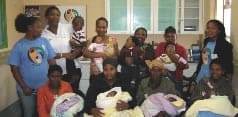By Tim Hyland
Mother-to-child transmission of HIV/AIDS has essentially been eradicated. At least, that’s the case in the developed world.
In the developing world, meanwhile, millions of women continue to pass the deadly virus along to their babies — even though this transmission is completely preventable.
 Gene Falk, WG’80, is working to correct what he sees as one of the great wrongs of modern medicine.
Gene Falk, WG’80, is working to correct what he sees as one of the great wrongs of modern medicine.
A few years ago, Falk left a successful media career — he served as Senior Vice President at Showtime Networks, producing and promoting everything from Rolling Stones concerts to Don King’s boxing events — to serve full-time as executive director for the Cape Town, South Africa nonprofit called mothers2mothers. He had co-founded the organization with this old friend and Williams College roommate, Dr. Mitch Besser, in 2001. Offering medical help and guidance to HIV-positive pregnant women in sub-Saharan Africa, mothers2mothers ensures these women get the medical care they need to save their children from HIV — and the support they need to thrive despite the still-strong stigma surrounding AIDS there.
“Mothers2mothers is focused on preventing the transmission of HIV from pregnant women to their children,” says Falk, who visited Wharton in mid-April to speak with students about his work with mothers2mothers and his experiences as a social entrepreneur. “That may sound daunting, but actually, medically, it’s quite easy, which is why there are so few HIV-positive children in the developed world anymore. In the 1980s and 1990s, you heard a lot about AIDS babies. You don’t hear that anymore.”
Eventually, Falk and his colleagues at mothers2mothers would like to be able to say the same about Africa. They’re working toward that goal in two ways: First, by identifying HIV-positive mothers and getting them the life-saving medicines they need; second, by training some of those women to become “mentor mothers” for other HIV-positive pregnant women. These mentor mothers serve a vital role for mothers2mothers, educating women in their communities about how they can live healthier, fuller lives — even after HIV infection.
“We created a model where we train women, we hire them, and we send them back into their communities — into the clinics where treatment is available — so when a doctor says to a young woman, ‘Did you know you have HIV?,’ he also says, ‘Here’s someone from your community you can talk to,’” explains Falk, a longtime activist for gay and lesbian rights and winner of the Wharton Club of New York’s Joseph Wharton Social Impact Award in 2008.
“Our mentor mother then says, ‘I’m from your town, I’m HIV-positive, but I’m not sick, I’m not skinny, I had a baby last year, my baby is healthy and HIV-negative. This is going to be your life, too.’ It changes the entire dynamic.”
The model has proven to be a huge success. Mothers2mothers engages in about 200,000 client interactions per month and now employs more than 1,500 women at more than 500 sites in South Africa, Lesotho, Zambia, Kenya, Malawi, Rwanda and Swaziland. Falk says he’s confident the organization will continue to provide its crucial services for years to come.
“We’re looking at this as a third-party payer — that people are buying services for someone else, whether that’s the government or a private donor or foundation,” Falk says. “And consequently, there are realistic expectations about the quality of the services that we provide, as there would be in any situation like that. I think that’s been a large part of our success. We didn’t know this wasn’t a typical approach.
“There isn’t a private-sector business model that will work for us. But if there’s going to continue to be investment in public health, programs like ours are going to have to grow, because there is actually no other option. If you’re going to rely on public health professionals to deliver care in the developing world, well, they’re not there. There’s more technology, there are more solutions, and there are fewer providers.”



























